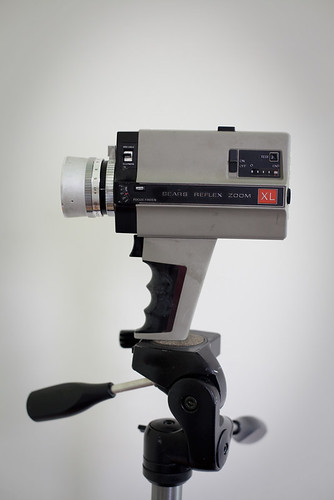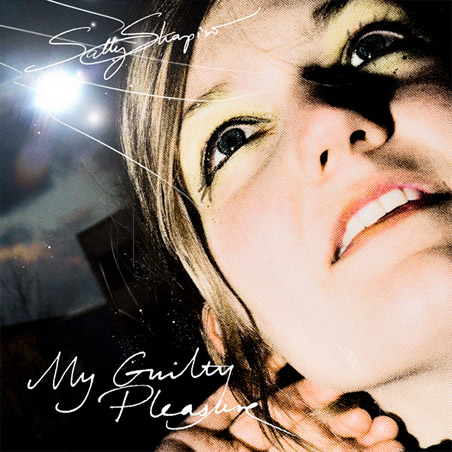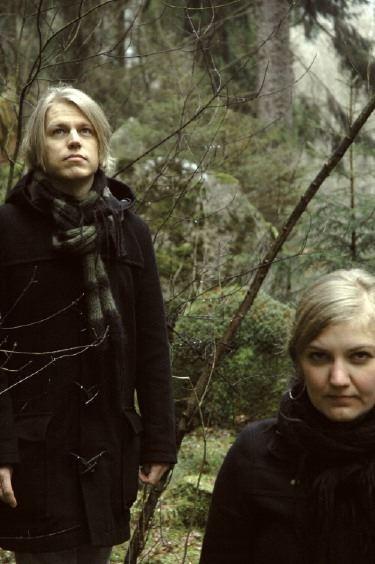 JAZZ
JAZZ In Which We Try To Please So Many People
 Wednesday, January 6, 2010 at 12:12PM
Wednesday, January 6, 2010 at 12:12PM 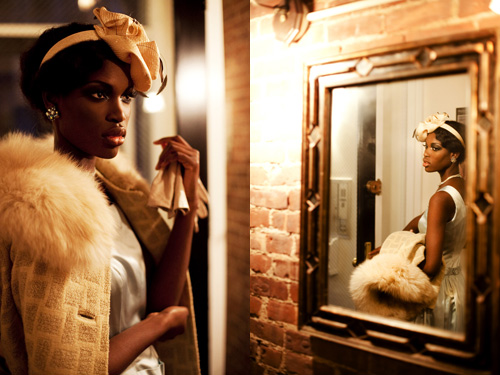
The Most Beautiful Feeling
by JAMIE BECK
The photo shoot originated from the hats themselves - they are courtesy of Dallas-based hat designer Cassandra MacGregor. From there and after our model Sade came on board the concept evolved quickly into a cross section of the life of a Harlem Jazz singer, inspired by Billie Holiday. Billie's music is emotionally charged and echoes the struggles she faced in her professional and personal life. She achieved fame but was never treated the same as white singers who otherwise were her equals in both talent and drive. Our photo story pays homage to Billie Holiday while heightening the glamour in a way that may not have been as accessible more than half a century ago.
The following interview with Billie was conducted by Mike Wallace in November of 1956 for the radio. Hats are by Cassandra MacGregor. The model is Sade of ORB Models. Styling is by Meagan Camp. Makeup by Susie Sobol. Hair by Marcel Dagenais. Photography Assistant is Tiffany Arement.
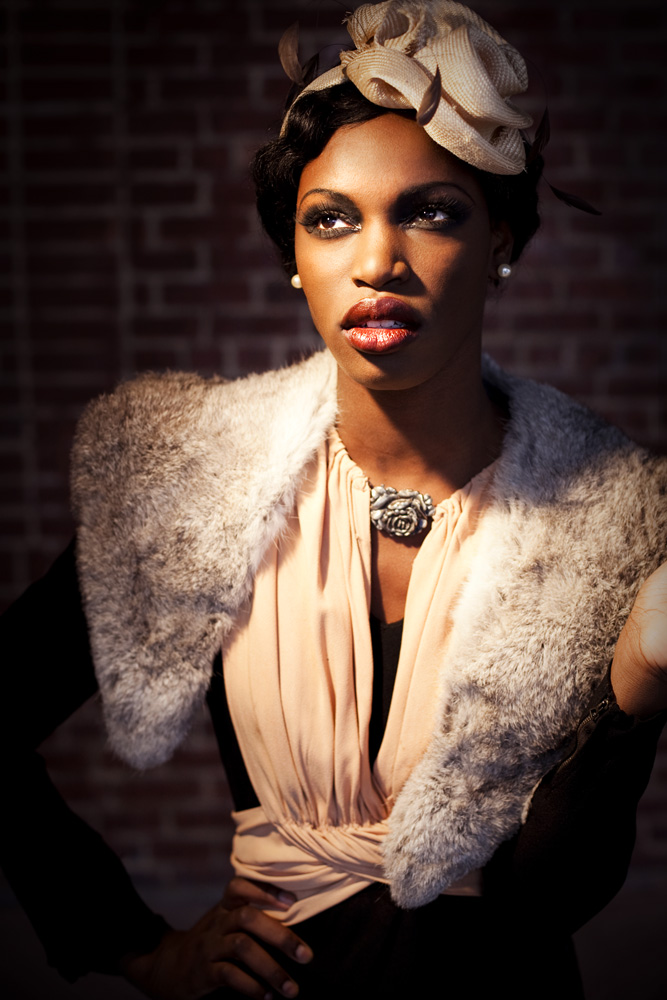
BILLIE HOLIDAY: I heard a record by Louis Armstrong as we call him Pops it was called West End Blues and there was a lady who would call and she has a little fast house, sporting house. I used to run errands for her. He would sing, "Awida, awidawida!" I wondered why why he didn't sing more words, but I wanted his feeling. He had the most beautiful feeling. So I wanted his feeling, and I wanted Bessie's volume. She had a big loud sound.
MIKE WALLACE: And you got them both. There seems to be a real companionship, Lady, among the greats in the jazz world. It doesn't seem to be as competitive a field as some others. In some other fields, when you get up there it's kind of cutthroat. In the jazz field the jazz greats seem to love one another and work with one another.
You mean like Dizzy and Eubie and myself and Ellen, we are all good together? Well I guess we all suffered and we all had it, so when we get there, we appreciate it. That's the way I feel about it.
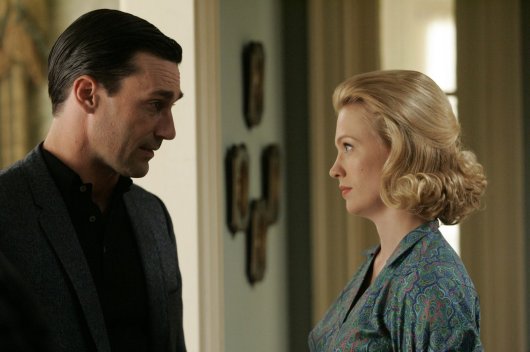
I imagine that's so. Were you a great friend of the late Art Tatum, the great jazz pianist who died just a few days ago?
Oh, yes. He loved my mother so much and Mom loved him. Whenever he would come to New York or was around he would always stop with us. Let me tell you a funny story. Him and Bernie Hanighen - he wrote songs - got in a little tiff one morning in front of Jimmie's Chicken Shack in Harlem. I don't know if I should tell this story or not, Bernie will probably shoot me. Art kept saying, "Bernie leave me alone, leave me alone, I don't want to hit you." He couldn't even tell where Bernie was, all turned about his sense of direction. Bernie was behind him, and when he went to kick him, he kicked him in the back. I knew Art very well. He was my dear friend. He's a doll.
Speaking of Art Tatum, do you have any idea how old he was when he died?
I don't know, but I don't think Art could have been any more than 56, 54 years old.
Was he that old?
He was in his fifties.

Because the question I was going to ask is, why do so many jazz greats seems to die so early?
Mike, the only way I can answer that question is that we try to live one hundred days in one day and we try to please so many people and we try...like myself I want to bend this note and bend that note, and sing this way and sing that way, and get all the feeling, and eat all the good foods and travel all over in one day, and you can't do it. I think that's why.
There was one spot in your book that I think revealed a little bit of you. It didn't seem to me that you liked to live that way that much anymore. You wrote, "You've got to have something to eat and a little love in your life. Everything I am and everything I want out of life goes smack back to that." When did you discover that and what does that mean?
We all have to eat and we all have to sleep, and I was hungry so long. Now that I do know how to eat and sleep and I have traveled...ask me that question again. I can answer it better than that.
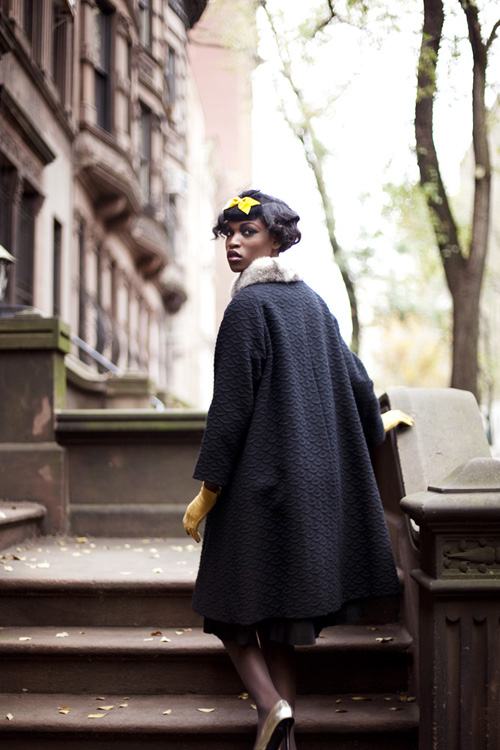
As I read, and as you started to answer, I discovered what you said a little earlier was right. You like to take life by the fullest and live it while you've got it. As you suggested, that's why some jazz performers die young because they do. They get a little to eat and a little to love. Life is to use, is the way that you see it.
You must have love. All I had was my Mom. I never had brothers or sisters or cousins or uncles or people like that. All we had was one preacher and he would come every Sunday. And Mom would say, "Come on, eat all you like Reverend So and So!" I can't even think of his name. In those days I did have a cousin. I have a cousin Charlotte and a cousin Dorothy. The children had to wait. He would bring his wife and his whole family sometimes, and we'd wait and we'd wind up with the gravy. One Sunday I made a boo-boo and said, "Mama, you know there's no more in the pot!"
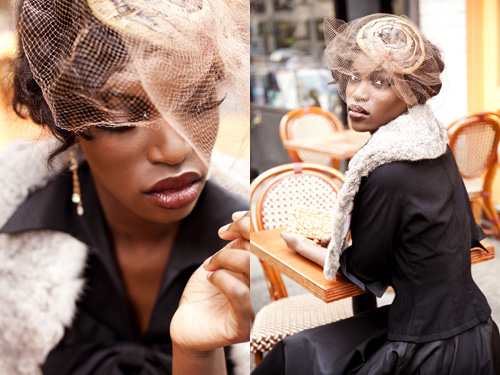
You've mentioned some of your good friends who are musicians. But I know a couple of friends of yours who aren't musicians. I'd like to know how you got to know them and what it is about Tallulah Bankhead, and Charles Laughton, and Orson Welles.
I know them because they was brave enough to come up and holler when they was starting jazz. At that time most people were afraid to come holler, and those who did, it was one of those things. "Just one of those things...."
How long ago was that?
I'm not telling my age now. When I started I was only about fourteen. I'll never forget the night I met Mr. Laughton. He came in, and I had no idea he was a movie actor. He was looking for his valet. That's how he got wandering around up there.
Up in Harlem?
Yeah. I think his name was Georgie. "Just lookin' for Georgie now..." I said, "He's asking about Billie Holiday?" "He's looking for Georgie." I said, "Who's that man?" That's how we got acquainted. Afterwards he always came and see me. He's been very kind. And Ms. Bankhead, I think she's the end. I love her.
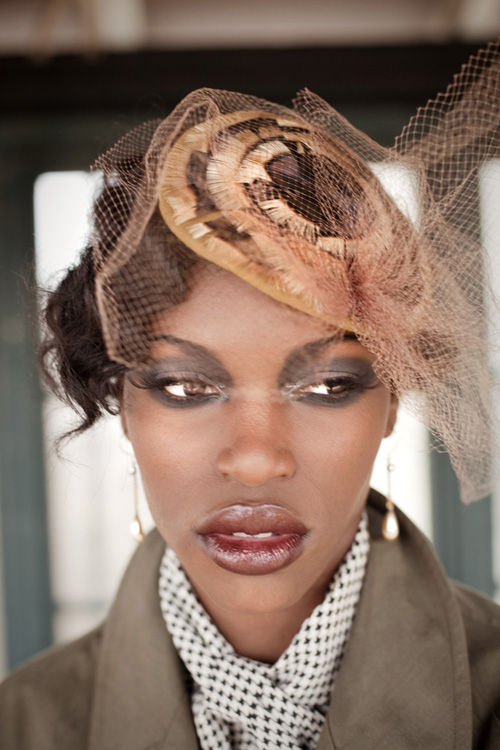
When you mention people like Ethel Barrymore, Tallulah Bankhead, is it the fact that you're all performers? Is that what you have in common?
They're not performers, they're actresses, artists. I wouldn't put myself in the same room.
You wouldn't put yourself in the same room with them? You've worked as hard, you've thought as much about it. You've developed a style, a technique. Why not? Why don't you feel that you have the same quality, why are you not such an artiste as them?
Maybe I am in my little way. My god, they make me cry. They make me happy. I don't know if I've ever done that to people, really.
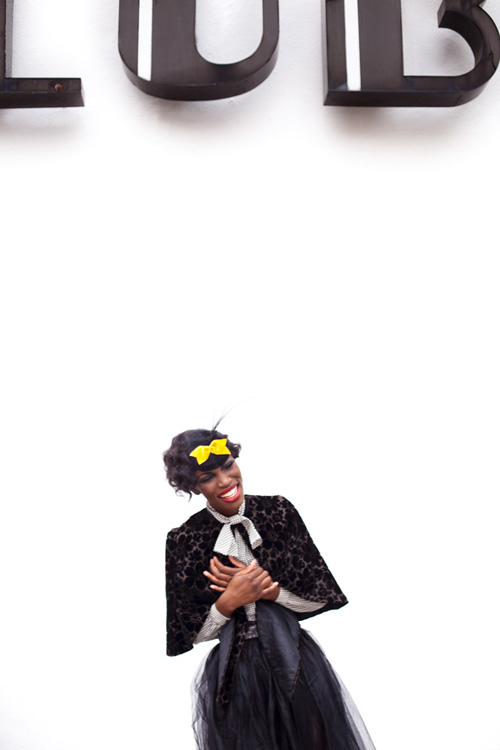
I think you do. You know, one of the most remarkable things about jazz performers is that white or colored, you're way ahead of the rest of us when it comes to desegregation. I heard a story about you this afternoon from a good friend of yours by the name of Leonard Feather.
He is my boy, I love him.
Leonard told me about the time, Leonard and Bob Bach, when you sang at the Ritz-Carlton in Boston.
Up on the roof, ha ha.
And there was still a policy of no colored singers being with a white organization. Tell me that story.
I'd rather not. It was a drag. It was a drag for Helen too. Because she's a sweet kid. They said I couldn't sit on the bandstand. Which I didn't want to do. I never did. Harvey had a rule that we're supposed to sit on the bandstand. Except for Tony, who was in the band, no one else was up there. I said, "I feel like a fool sitting up here." They sat me up there 10, 15 minutes before I sang. I didn't like it. I was sneaking off, I had business in the ladies room or somewhere. Poor Helen, she'd have to sit there. We finally got the Ritz Carlton - that was a big, good deal for me because I didn't have to sit. She was sweet about the whole deal. She's a wonderful girl. She said, "I don't see here why if I can sit here, Lady can't sit here." I said, "I don't want to sit, you remember us." It was one of those things. After a while it worked out very nicely.
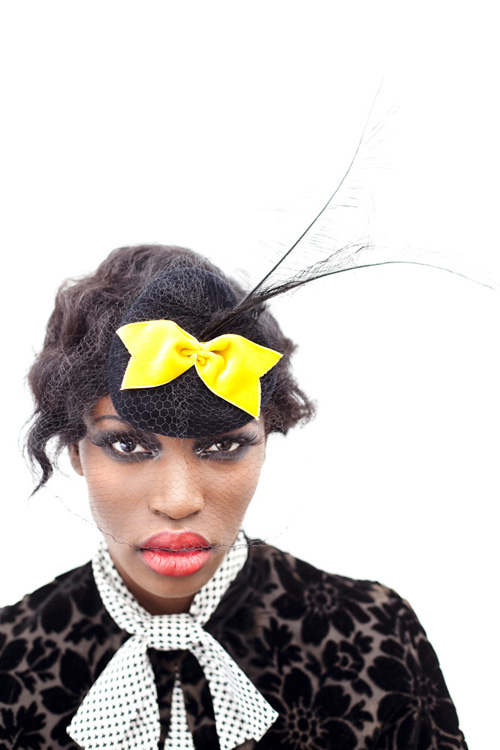
Why is it that the color thing has not ever really been as important to musicians as it is to some of the rest of us?
The only answer I can give to that is I guess we all we get a chance to meet more people, and bigger people. Like I met Roosevelt's son. How did I meet him? He came from society. And I knew enough to go say, "Hello, you're Roosevelt's son." He's not going to say, "Get away from my table." He's going to say hello. I think we have more of an opportunity to meet people as they are. They're nice people, they're going to show us around. That's why musicians and actors and artists can sort of straighten all that deal out. And if you get up and sing and dance or make a speech - and if they like it - everybody gets to be one happy family. That's the only way I explain it.
As a former preacher how does your husband react to some of your more torrid blues songs?
He tells me how to sing, and what to sing. It's just getting terrible.
Jamie Beck is a contributor to This Recording. She is a photographer living in New York. She last wrote in these pages about vintage cameras. She tumbls here. Hats are by Cassandra MacGregor. The model is Sade of ORB Models. Styling is by Meagan Camp. Makeup by Susie Sobol. Hair by Marcel Dagenais. Photography Assistant is Tiffany Arement.
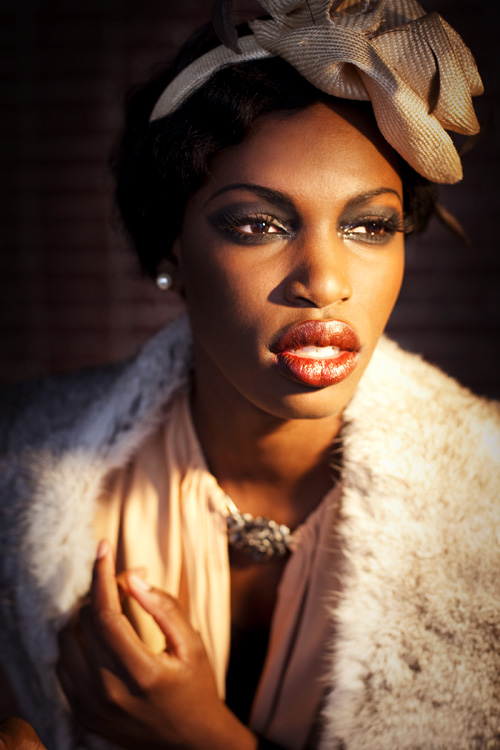
"The Very Thought of You" - Billie Holiday (mp3)
"Long Gone Blues" - Billie Holiday (mp3)
"All of Me" - Billie Holiday (mp3)
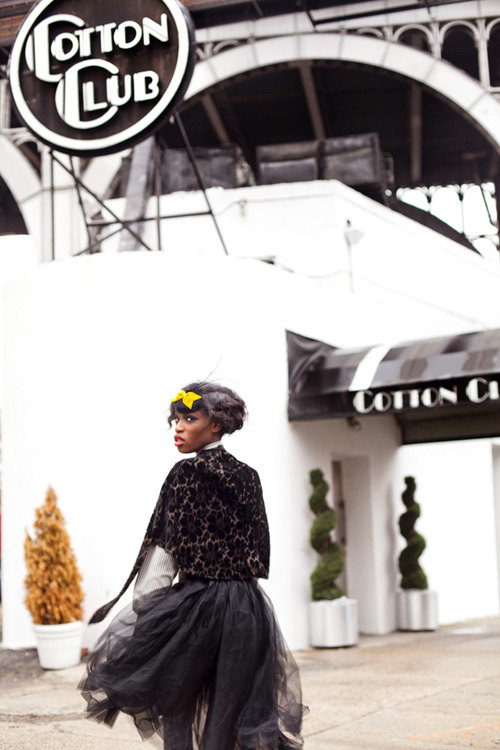
 billie holiday,
billie holiday,  jamie beck
jamie beck 
































